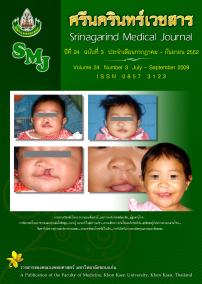ThaiScience
ThaiScience
SRINAGARIND MEDICAL JOURNAL
Volume 35, No. 03, Month MAY, Year 2020, Pages 266 - 271
Effect of nelumbo nucifera stamen extract on memory deficits in ab-induced rat
Jenjiralai Phanphak, Chantana Boonyarat, Ploenthip Puthongking, Jariya Umka Welbat, Komsun Bunreungthong, Nutchareeporn Nillert, Wanassanun Pannangrong
Abstract Download PDF
Background and Objectives: Nelumbo nucifera (lotus) is a key plant in Thai traditional medicine that has anti-diabetic and anti-oxidant activities, and inhibits acetylcholinesterase enzyme. It is widely consumed as functional food. This study investigated the effect of N. nucifera stamen extract (NNSE) on memory deficit in amyloid beta (Aβ)-induced rat. Methods: Forty adult male Sprague Dawley rats were divided into 5 groups, each group consisting of 8 rats as follows: Group 1, the normal control group. Group 2, the vehicle plus Aβ group (V+Aβ), received 0.5% sodium carboxymethyl cellulose, orally and was injected with amyloid-β via the lateral ventricles. Group 3, the vitamin C plus Aβ group (Vit C+Aβ), received vitamin C orally at 200 mg/kgBW., and was injected with Aβ via the lateral ventricles. Group 4, and 5, the NNSE plus Aβ groups (NNSE250+Aβ, NNSE500+Aβ), received NNSE orally at doses of 250, and 500 mg/kgBW, respectively, and were injected with Aβ via the lateral ventricles. All treatments were performed for 33 consecutive days. At day 21, Aβ (1- 42) was injected via both sides of lateral ventricles. Ten days after Aβ1-42 injection, the rats were tested for locomotor activity and recognition memory by using the open field and novel object recognition tasks, respectively. Results: The NNSE at dose of 500 mg/kg BW significantly increase the velocity and moving distance in locomotor activity in rats after induced with Aβ. Moreover, NNSE at doses of 250 and 500 mg/kgBW significantly improve short-term recognition in cognitively impaired rats. These doses of NNSE also tend to improve long-term recognition in memory impaired rats. Conclusions: NNSE improve memory impairments induced by Aβ, especially short-term memory. Furthermore, the high doses of NNSE stimulates muscle function by increasing speed and movement distance.
Keywords
amyloid-B, Nelumbo nucifera stamen, novel object recognition, oxidative stressSRINAGARIND MEDICAL JOURNAL
Published by : Faculty of Medicine, Khon Kaen University
Contributions welcome at : http://www.smj.ejnal.com/e-journal/journal/index.php
